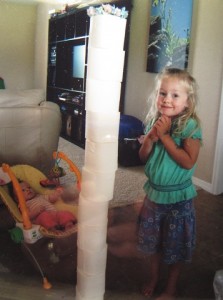Our church loves children. They and all their extraneous noises are welcome in the services, and our pastors frequently espouse the value of their generation. To make our worship hour more palatable for youngsters, a big basket at the back of the sanctuary sits filled with small cloth bags of quiet toys: crayons, coloring paper, shoelace-thread, sewing cards. All of us want children to know they’re a high priority to us, and by association, a high priority to God.
Of course a nursery is available for parents who need a break from their babies, or for children whose fussiness would distract other worshipers.
Today as we worked our way through the order of service, childish voices/noises erupted here and there along with the singing, praying, and preaching. Generally, though, quietness reigned. During the Scripture reading we suddenly heard a muffled but shrill baby’s cry coming from the narthex at the back of the sanctuary, behind closed doors. Maybe only those of us who are mothers heard it, but it was definitely a baby crying, probably being walked around by a nursery worker trying to quiet her.
Like a shot, a 20-something man jumped from his aisle seat and rushed toward the back of the sanctuary and out the double doors. Without even looking, he’d recognized the cry of his own child through closed doors, from far away, and above the speaker’s voice. Impressive.
As the service continued, the baby-crying stopped… within seconds. Whatever it was, daddy had fixed it.
That church-time mini-drama tugged my thinking right out of church and into heaven, specifically to God and his hearing abilities. Watching that young father bolt from the sanctuary was a demonstration of what God continually does for us. He’s always listening for our cries. And though the earth is populated with 7 billion people, all of whom are capable of crying, he recognizes the individual voices of each of us whether we’re whimpering, sobbing, or wailing.
The baby who cried in the church narthex this morning wasn’t making any specific request: “I want Daddy!” or “I’m hungry!” or “I’m frightened!” It was just a cry. But never mind the reason. Her father jumped from his seat and hurried to her anyway.
God does the exact same thing. If we’re expressing a need, he comes to us quickly, but even if we don’t know what we need, he comes then, too. By his strong response to our troubles, he’s saying the same thing our responding daddy was saying this morning: you, child, are important to me, a top priority. I’ll do whatever it takes to help you when you need me.
How wonderful to let children know, from their earliest days, that they’re important to us and to the church, and more significantly, to God. And we oldsters need to remember, the same goes for us.
“Lord, hear my voice. Let your ears be attentive to my cry.” (Psalm 130:2)







